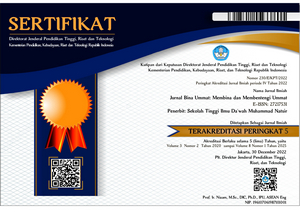MODEL PENDIDIKAN DA�I BERBASIS MASJID Studi Terhadap Pondok Pesantren Tahfizh Al-Qur�an Khadijah Kubu Raya
DOI:
https://doi.org/10.38214/jurnalbinaummatstidnatsir.v6i2.191Keywords:
Da�i education model, Mosque, Islamic boarding school Tahfizh Al-Qur�an KhadijahAbstract
This research focuses on the dai education model at the Khadijah Tahfizh Al-Quran Islamic Boarding School, which is a Quranic school that applies a mosque-based dai education model. In this Islamic boarding school the mosque is the center of all the activities of the students, so its function is not only limited to printing cadres memorizing the Quran but also printing cadres dai ilallah. The method used in this study is descriptive qualitative which is analyzed with social learning theory. The results found in this study that there are several learning processes applied in the mosque-based concept in this Islamic boarding school, which emphasizes attention, memory, production, and motivation. The learning interaction model is obtained from three things that influence each other including environment, behavior, and cognitive.
Keywords : Dai education model, Mosque, Islamic boarding school Tahfizh Al-Quran Khadijah.
Published
Versions
- 2023-12-31 (2)
- 2023-12-31 (1)
Issue
Section
This work is licensed under a Lisensi Creative Commons Atribusi 4.0 Internasional.
Authors who publish with this journal agree to the following terms:
- Authors retain copyright and grant the journal right of first publication with the work simultaneously licensed under a�Creative Commons Attribution License that allows others to share the work with an acknowledgment of the work's authorship and initial publication in this journal.
- Authors are able to enter into separate, additional contractual arrangements for the non-exclusive distribution of the journal's published version of the work (e.g., post it to an institutional repository or publish it in a book), with an acknowledgment of its initial publication in this journal.
- Authors are permitted and encouraged to post their work online (e.g., in institutional repositories or on their website) prior to and during the submission process, as it can lead to productive exchanges, as well as earlier and greater citation of published work (See�The Effect of Open Access).




